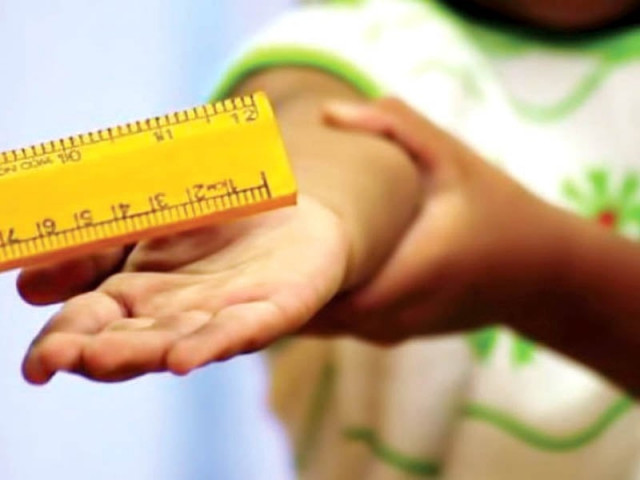Corporal punishment: Student accuses invigilator of breaking his leg
Boy claims school administration did not provide him transport to the hospital.

Dragged by the hair and tossed onto a desk, the corporal punishment suffered by seventh grader Mohsin Iftikhar left him with a broken leg.
The schoolboy told the police he decided to discuss the previous lesson with a class fellow on Monday when the teacher was late. That is when the proctor, Yunas, came in and started beating him for making noise, he added.
Mohsin lodged an FIR at the police post in Ayub Medical Complex, alleging that the proctor’s assault caused the injury. He also said the school administration did not provide him with transport to the hospital.
The police registered a criminal case against Yunas, who remains at large, under Section 324 of the PPC.
Dr Noman at the hospital confirmed the student had suffered a fracture and was undergoing the necessary treatment. School officials were unavailable for comment, but one teacher said the guard, Naseer, took the injured boy to the hospital with the consent of the administration.
Growing number of cases
Commenting on the growing number corporal punishment cases in Hazara, HRCP’s district coordinator Madni Ehjaz Jadoon said nearly all go unreported due to two main reasons; the first being that people were generally unaware of the law and where to seek justice. The second was that many parents gave teachers the authority to physically punish their children.
Jadoon said five cases of corporal punishment, which is against the law, emerged from Hazara over the last three months. He pointed out that one of the main reasons students dropped out of school was to escape such punishments.
Human Development Organisation (HDO) Programme Manager Adeel Ahmed said that during 2012, the Khyber-Pakhtunkhwa government prohibited corporal punishment as it violated the UN Convention on the Rights of the Child. He pointed to Section 34 of the K-P Child Protection and Welfare Act 2010, which states that anyone committing such an offence could be punished with a six-month prison term, a Rs50,000 fine, or both.
Ahmed regretted the fact that no teacher had faced action for corporal punishment and this encouraged them to the extent that they now had no qualms about breaking children’s limbs.
He urged the provincial government to implement the Child Protection and Welfare Act 2010.
The programme manager said his organisation had been counseling victims of corporal punishment for the last years eight years and their experience indicated that it had a negative impact on the personality of children.
Published in The Express Tribune, August 27th, 2014.













COMMENTS
Comments are moderated and generally will be posted if they are on-topic and not abusive.
For more information, please see our Comments FAQ